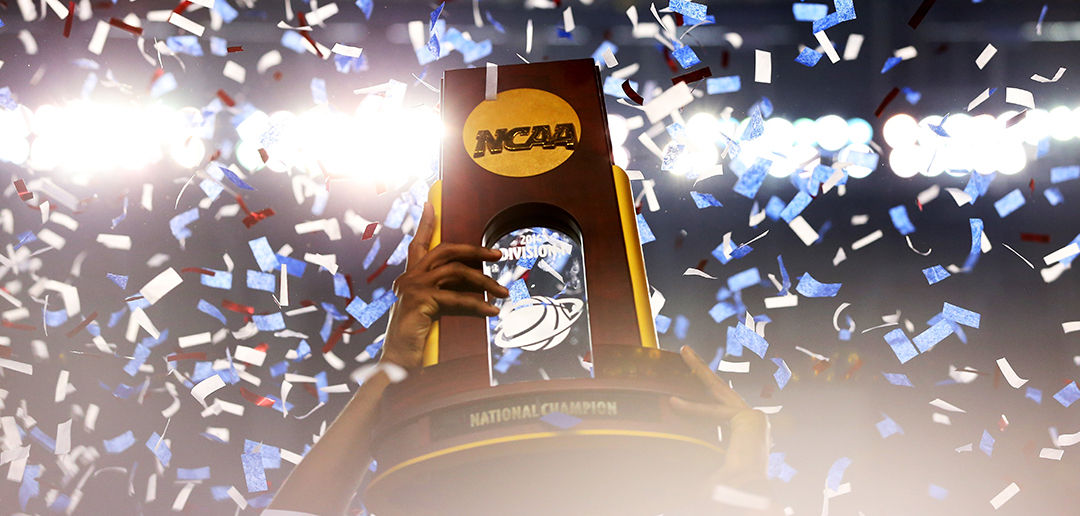Ah, March, the time of year when our national focus turns to brackets. If the fever hasn’t caught you yet, it will. You know the symptoms:
- The frenzied search for that perfect Cinderella.
- Plummeting work productivity as you steal glances at midday games and show up bleary-eyed and exhausted after a late-night buzzer beater.
- Intense concern for the dinged-up ankle of a shooting guard for a school you’d never heard of two weeks ago.
Personally, I think the NCAA Basketball Tournament is the best event sports has to offer. A month of wall-to-wall, unpredictable basketball? Yes, please.
It’s easy to get swept away in the excitement and pageantry, and settle into hour after hour of mindless consumption. This isn’t to say that it’s wrong to enjoy the games and the spectacle of the event—it’s not.
But what if Christians engaged in March Madness a little differently? What if we watched with spiritual eyes, and took a few small steps to turn passive watching into something more active?
Interestingly, this strikes close to what basketball’s inventor, Dr. James Naismith, had in mind when he created the game.
Mark Householder, President of Athletes in Action, was able to meet Dr. Naismith’s grandson, Jim, and explains what he learned about basketball’s backstory:
“James (Naismith) had a bit of a troubled life as a young man, found direction in a relationship with God in his early 20's, and out of gratitude for his life change wanted to give back and make a difference in the lives of other young people. Hence, basketball was invented as a game with a spiritual purpose. Naismith saw basketball as a tool with a purpose ‘to help lead young people to the Master.’”
Here are six ideas for putting on a pair of spiritual glasses this March, and using basketball as a tool to help lead people to Jesus, the Master:
Be Prayerfully Curious
Sixty-eight men’s teams and sixty-four women’s teams enter their respective tournaments. Some of the names on the bracket—Duke, UConn, Kansas—are instantly recognizable. Others are so obscure that many people aren’t even aware they exist.
As you fill out your brackets and settle in to watch the games, pull out your preferred device and do a little research. See what you can learn about Lipscomb or Quinnipiac, and what you might not have known about North Carolina or Ohio State. Where is the school? What is it known for? What is campus life like? What about spirituality on campus? Are there Christian groups seeking to share Christ with students there?
Within minutes, you’ll be ready to offer specific, informed prayers for that school. You can pray for the students and campus ministry leaders seeking to make Christ known, for God to meet a particular need or bring transformation on the campus as a whole, and even for the team and athletic department itself.
Student-athletes are often high profile figures on campus, which can bring pressure and temptation. On most of these campuses, Athletes in Action or Fellowship of Christian Athletes or another sports-related ministry is offering discipleship and the hope of Christ to these young men and women. A large number of them will go on to areas of leadership after graduation, both in and out of their sport. They need our prayers.
You won’t influence who wins and loses, but you can impact the players, and their school, through prayer.
Half of Halftime
Speaking of prayer, what if you spent half of halftime (roughly 8 minutes) praying for both of the schools and athletes involved in the game?
Halftime consists mostly of commercials and studio analysts filling time until the game resumes. Why not mute the TV and seek to bless the game’s participants, and their communities. Let your research inform your prayers, and incorporate some of the other ideas listed below.
Consider How Winning and Losing Affects The Players
The 18-22 year olds we’ll watch this month (another important fact to remember) are, to a player, living out something they’ve dreamed about for years, perhaps even since their earliest memories. They’re still so young, and the pressure they feel is intense. Win or lose, that intensity will be exacerbated.
All athletes—especially those playing at the highest levels—must eventually face a crucial question: Is my sport the Main Thing in my life?
It’s a question of purpose and identity. The joy of winning--which will only prove fleeting--and the agony of losing both have a way of exposing how deeply an athlete’s identity is tied to their performance. A curtain is pulled back, and many athletes are faced with an idol they never knew was there, or one that proves to be empty and lacking.
As the games end, pray for the winners. Pray that in the moments after the ecstacy fades, they would naturally wonder why winning didn’t provide deeper fulfillment. Pray that they’d recognize that something else—something greater—is missing. And pray that God would reveal Himself as the One who offers a richer, lasting satisfaction.
Pray for those who lose as well. Pray that the ache of disappointment would lead to an acute awareness of their deeper longings, and for greater openness to spiritual conversation.
How You Play (And Watch) The Game Matters
Jesus says, “In the same way, let your light shine before others, so that they may see your good works and give glory to your Father who is in heaven” (Matthew 5:16).
Many Christ-followers will take the court or roam the sideline this month, and they’ll be doing so in a highly scrutinized, pressure-packed environment. Pray that they will represent Christ well, through intentional acts of sportsmanship and humility, as well as through the fruit of the Spirit (Galatians 5:22-23) that overflows from them naturally.
As we witness these good works, we can obey Jesus’ words and give glory to God. Actions like encouraging a teammate after a mistake, helping an opponent up, and showing respect to the ref after a questionable call are opportunities for us to direct worship to God.
Christian athletes may also be presented with public opportunities to represent Jesus—postgame interviews, press conferences, etc. In some cases these will arise suddenly. Pray that they’d be “prepared to give an answer” (1 Peter 3:15), and that God would use their words and witness to draw people to Himself.
But behavioral conduct and faith-sharing opportunities aren’t just for players and coaches. Many of us will be watching the games in public settings, or with our kids. What do they see as we watch? Someone who berates the referee and spews hatred toward an opponent, or someone who models grace and acknowledges that, even though they can be highly emotional, these are just games?
Take these considerations a step further as well. Where is your platform that could offer opportunities to speak about Christ? What do your actions and words do to help or hinder those opportunities?
The FBI Scandal: Don’t Ignore or Judge
An ongoing FBI investigation has loomed over college basketball all season. It’s complex and doesn’t need a detailed discussion here, only to note that layers of corruption are being exposed throughout the game.
References to this scandal throughout the tournament are inevitable. It’s an ugly scar on a wonderful sport and event, but we know that the truth can set people free. When the scandal is mentioned, we can use it as a prompt for more prayer—that corruption would come to light and true transformation would take place, both in the hearts of those implicated and in the governance of the sport as a whole.
We can also check our natural impulse to pass judgement with the recognition that corruption is everywhere, within any man-made system. It’s an unfortunate byproduct of the brokenness that permeated the world at the Fall of Man (Genesis 3). Instead of judging, we can consider where corruption may lie in our workplaces, our churches, and even in our own hearts. How can you push against it and invite transformation through Christ?
Remember What’s Happening Behind the Scenes at The Final Four
The National Association of Basketball Coaches holds its annual convention during Final Four weekend in the host city—San Antonio this year. Athletes in Action has an active, visible presence, through a booth on the convention floor as well as three significant events.
The largest event occurs Saturday morning of Final Four weekend: the Legends of the Hardwood breakfast. Now in its 22nd year, the breakfast examines character, integrity, and faith in sport and life through an entertaining and enlightening program.
The John Wooden “Keys to Life” Award will be presented to University of Tennessee men’s head basketball coach Rick Barnes. The award honors a member of the basketball community who lives out qualities exemplified by Coach Wooden: outstanding character, integrity, and leadership on the court, in the workplace, in the home, and in the community.
Over 1,000 people are expected to attend, many of whom are business executives, civic leaders, and basketball personalities who may never set foot in a church. Presenters will clearly share the Gospel and invite attendees to respond.
The other two events are focused on Coaches and their wives. Coaches are invited to a forum where faith principles and godly character are applied to coaching, and coaches wives are invited to a breakfast that seeks to encourage and minister to them in their unique and often-difficult role.
Please be praying for these events and the many people who will hear the Gospel through them. The impact of this ministry could be widespread, affecting the city of San Antonio and the basketball community as a whole.














